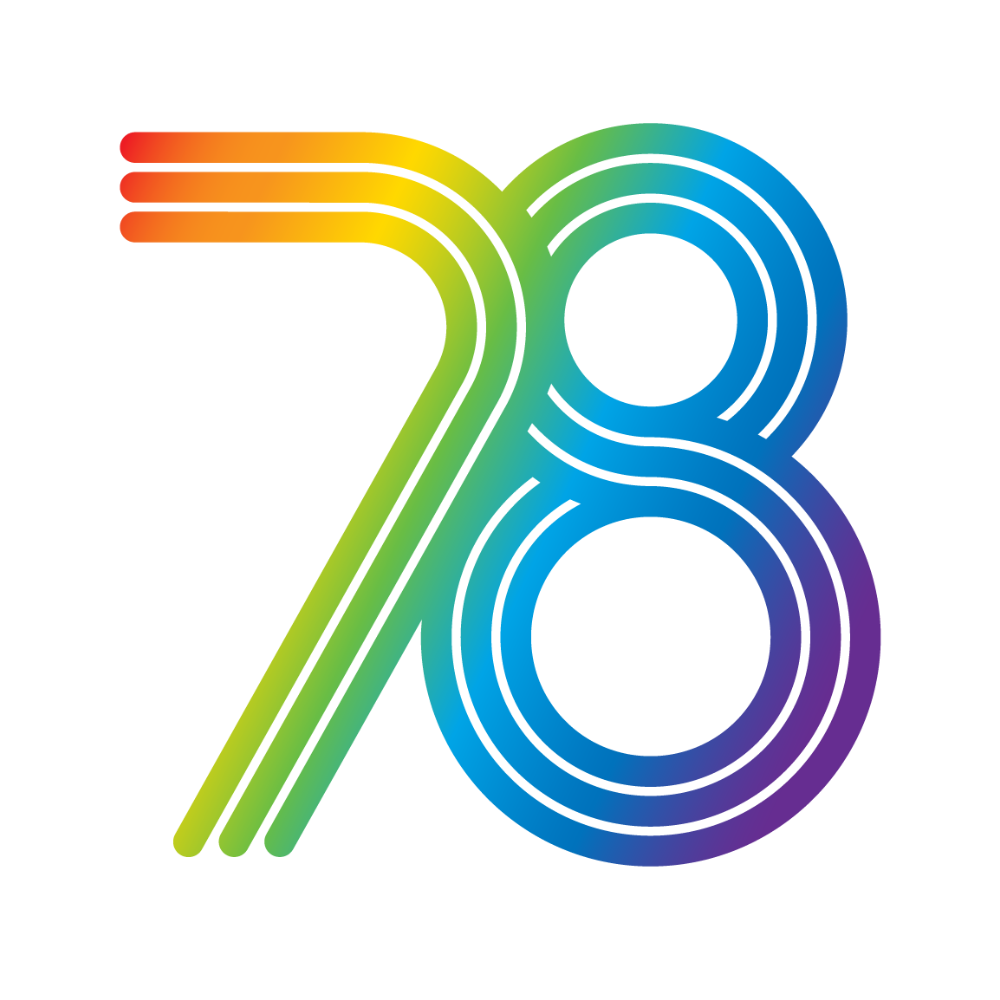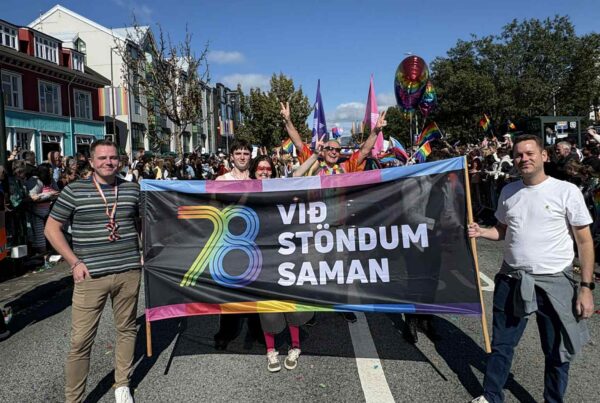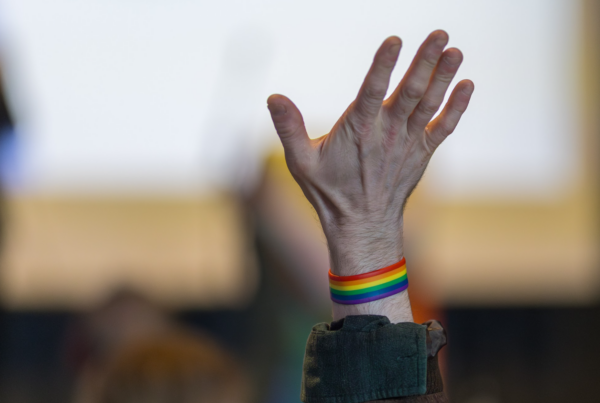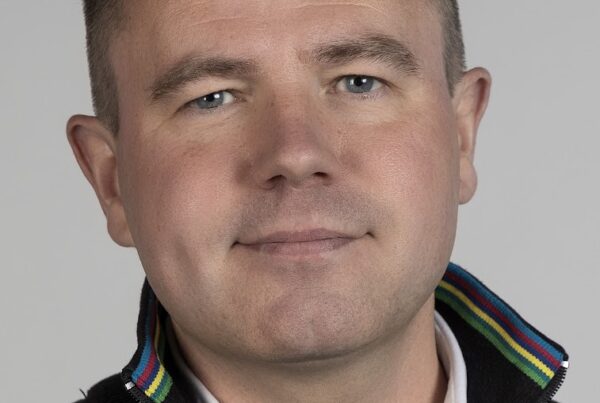Gleðilegan kvenréttindadag!
Í tilefni dagsins birtum við þýðingu á ávarpi sem Bergrún skrifstofustjóri flutti í mars síðastliðinn á Kvennaþingi Sameinuðu Þjóðanna í New York, um aðdraganda Kvenna- og kváraverkfallsins þann 24. október 2023.
Í dag langar mig að tala um samstöðu í baráttunni fyrir samfélagslegum breytingum. Ég vil tala um ákvörðunina sem kvennahreyfingin tók til þess að standa með baráttu hinsegin fólks. Þá staðreynd að kvennahreyfingin á Íslandi tók ákvörðun um að standa með trans konum og kynsegin fólki.
Kvennaverkfallið árið 1975 var stór þáttur í því að íslenskar konur gátu stigið út úr hefðbundnum kynjahlutverkum. Þannig varð til pláss fyrir samkynhneigða karla og konur til þess að skora á þessi sömu hlutverk – og í kjölfarið hefur myndast rými fyrir annað hinsegin fólk til þess að skora á hefðbundin hlutverk kynjanna.
Samtökin ‘78 hafa það ávallt hugfast að barátta hinsegin fólks byggir á og lítur til kvennabaráttu. Kvennahreyfingin á Íslandi sem og samtök hinsegin fólks vinna saman að því að allar konur séu með í baráttunni, því kvennahreyfingin þarf á trans konum að halda.
Í raun er það holdgervingur feðraveldisinsins, kynjakerfisins, hvernig komið er fram við trans konur í okkar menningu. Sís konur, við þekkjum hvernig það er að þurfa að þola háð og orð okkar dregin í efa vegna kyns okkar, raddbeitingar, útlits eða áhugamála og svo mætti áfram telja. Sú staðreynd að trans konur verða fyrir þessum sömu fordómum er augljós birtingarmynd kynjakerfisins og kvenfyrirlitningar.
Trans konur eru sá hópur hinsegin fólks sem verður helst fyrir ofbeldi. Trans konur eru útsettari fyrir líkamlegu og andlegu ofbeldi, kynbundinni áreitni og fordómum, og um helmingur trans kvenna verða fyrir ofbeldi í nánum samböndum. Við getum ekki barist fyrir réttindum sís kvenna án þess að berjast líka fyrir réttindum trans kvenna. Hinsegin réttindi og kvenréttindi eru samofin, málstaður okkar er sá sami. Ef við leyfum réttindum trans kvenna að verða fyrir hnjaski þá eru sís konur næstar. Þessi tenging er augljós í þeim heimshlutum þar sem bæði réttindi sís kvenna og trans fólks hafa verið skert eða tekin í burtu.
Markmið Kvennaverkfallsins var að gera það skýrt að við séum í baráttu sem inniheldur allar konur. Baráttu fyrir trans konur, intersex konur, fatlaðar konur og konur af erlendum uppruna.
Á undanförnum árum hefur kynsegin fólk orðið sýnilegra og það hefur orðið greinilegra hvernig þau verða fyrir mismunun á vinnumarkaði, ofbeldi og áreitni – og að tungumálið okkar, íslenskan, gerir ekki alltaf ráð fyrir þeim heldur. Það var því skýrt að kröfur verkfallsins þurfti að taka til kynsegin fólks líka.
Samtökin ‘78 hafa höfðað til samfélagsins með sýnileika og skilaboðum um að allt hinsegin fólk sé metið að verðleikum og virðingu í okkar samfélagi. Samvinna Samtakanna ‘78 og kvennahreyfingarinnar er gríðarlega mikilvæg og samband okkar er sterkt.
Það var því auðvitað stórkostlegt að upplifa samstöðuna þann 24.október, þar sem var pláss fyrir hinsegin konur og kynsegin fólk. 100 þúsund konur og kvár stóðu á Arnarhól, hlið við hlið og sameinuðust um að standa gegn feðraveldinu. Skilaboðin voru skýr: Þú ert velkomin/ið, og þú skiptir máli. Þessi samstaða er ómetanleg.
Kynjakerfið og áskoranir sem við höfum rætt hér á Kvennaþingi Sameinuðu þjóðanna gengur þvert yfir allar konur, lesbíur, trans konur og tvíkynhneigðar konur, allar hinsegin konur. Baráttan er ekki búin og við þurfum einnig að skapa rými fyrir konur með óhefðbundna kyntjáningu, en sú umræða er rétt að hefjast.
Til hamingju með daginn konur!
////
To celebrate June 19th, we’ve published a speech delivered by our Office Manager Bergrún from the United Nation’s Commission of the Status of Women in New York in March 2024.
Today I want to speak about the strength of solidarity in the movement for social change. I want to speak to you about the decision that the women’s movement made in order to stand with the queer movement. I want to speak about the fact that the women’s movement in Iceland made a choice to stand with trans women and non-binary people.
The 1975 strike helped Icelandic women step out of their traditional gender roles, imposed upon them by society, and thus a space was made for gay men and lesbians to challenge those same roles – subsequently this space has opened up to other sexual orientations and gender identities.
We at Samtökin ‘78 have always been mindful of the fact that queer liberation builds on and supports women’s liberation. And because of that, the women’s movement and LGBTI organizations in Iceland were sure to make a strong tie to each other. To include trans women and nonbinary people in the fight for gender equality. The women’s movement needs trans women.
In fact, the treatment of trans women is a manifestation of the patriarchy of our culture. Cis women, we recognize how it is to be overlooked and undermined because of our gender, appearance, tone of voice, or interests. The fact that trans women also face these challenges is an obvious display of patriarchal structures and misogyny.
Trans women are one of the groups that face the highest risk of violence because of their intersectionality. Trans women are exposed to physical violence, mental abuse, sexual harassment and scrutiny, and around half of trans women experience intimate partner violence. We cannot fight for women’s rights unless we include trans women. Queer rights and women’s rights go together. Our cause is the same, we are fighting the same patriarchal systems. Our battles and challenges coexist, and if we allow for trans women’s rights to be lost, all women’s rights will be lost.
This connection is, of course, apparent in all parts of the world where rights of women and trans people are being stripped away.
And this was our objective in the Women’s Strike, to make it clear that we need to fight for all women. Fight for trans women, intersex women, disabled women and women of foreign origin. There was also an invocation to include gender-fluid and non-binary people, as they face some of the very same challenges women do. In recent years, nonbinary people have become more visible, and it is apparent they’re subjected to violence, harassment, challenges in the job market, – and the Icelandic language is also a barrier, as their existence can be diminished through speech and text.
Samtökin’s aim has been to appeal to mainstream society with visibility and messages of inclusion of all queer people. The cooperation of our organization with the women’s movement has been very important and our longstanding connection is strong.
It was therefore amazing that when it came to organizing the Women’s March last year, that the women’s movement had a clear intent to cooperate with us. To give space to lesbians, bi+ women and trans women – who face discrimination not only based on gender but also sexual orientation and gender identity, but to also include non-binary people.
So, we took a chance, to try to appeal to all women and non-binary people, to take part in what would be one of Iceland’s historic moments. And the visibility this event gave to non-binary people in Iceland is unparalleled. Non-binary people were treated as equals in all messaging and in speeches. A hundred thousand women stood side by side with non-binary people and included them in their fight against the patriarchy. It was a clear sign: You are welcome, (pása) and you are valued. And the importance of this solidarity cannot be understated.
The patriarchal systems and challenges addressed here at CSW are comparable for all women. Lesbian, bi+, trans women. This fight is not nearly over. In very recent times, it has become obvious that we need to address and challenge the way queer women, for example masculine presenting women and people perceived as women, are treated because of their gender expression. That conversation has just started, and we intend to continue it.
Happy June 19th!



